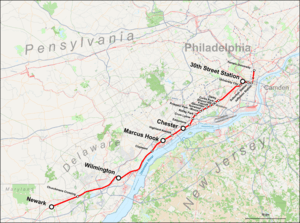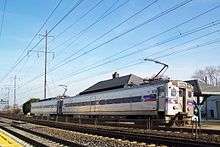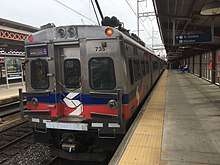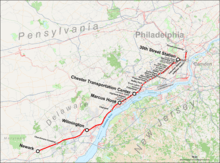Wilmington/Newark Line
The Wilmington/Newark Line is a route of the SEPTA Regional Rail commuter rail system in the Philadelphia area. The line serves southeastern Pennsylvania and northern Delaware, with stations in Marcus Hook, Pennsylvania, Wilmington, Delaware, and Newark, Delaware. It is the longest of the 13 SEPTA Regional Rail lines.
| Wilmington/Newark Line | |||||||||||||||||||||||||||||||||||||||||||||||||||||||||||||||||||||||||||||||||||||||||||||||||||||||||||||||||||||||||||||||||||||||||||||||||||||||||||||||||||||||||||||||||||||||||||||||||||||||||||||||||||||||||||||||||||||||||||||||||||||||||||||||||||||||||||||||||||||||||||||||||||||||||||||||||||||||||||||||||||||||||||||||||||||||||||||||||||||||||||||||||||||||||||||||||||||||||||||||||||||||||||
|---|---|---|---|---|---|---|---|---|---|---|---|---|---|---|---|---|---|---|---|---|---|---|---|---|---|---|---|---|---|---|---|---|---|---|---|---|---|---|---|---|---|---|---|---|---|---|---|---|---|---|---|---|---|---|---|---|---|---|---|---|---|---|---|---|---|---|---|---|---|---|---|---|---|---|---|---|---|---|---|---|---|---|---|---|---|---|---|---|---|---|---|---|---|---|---|---|---|---|---|---|---|---|---|---|---|---|---|---|---|---|---|---|---|---|---|---|---|---|---|---|---|---|---|---|---|---|---|---|---|---|---|---|---|---|---|---|---|---|---|---|---|---|---|---|---|---|---|---|---|---|---|---|---|---|---|---|---|---|---|---|---|---|---|---|---|---|---|---|---|---|---|---|---|---|---|---|---|---|---|---|---|---|---|---|---|---|---|---|---|---|---|---|---|---|---|---|---|---|---|---|---|---|---|---|---|---|---|---|---|---|---|---|---|---|---|---|---|---|---|---|---|---|---|---|---|---|---|---|---|---|---|---|---|---|---|---|---|---|---|---|---|---|---|---|---|---|---|---|---|---|---|---|---|---|---|---|---|---|---|---|---|---|---|---|---|---|---|---|---|---|---|---|---|---|---|---|---|---|---|---|---|---|---|---|---|---|---|---|---|---|---|---|---|---|---|---|---|---|---|---|---|---|---|---|---|---|---|---|---|---|---|---|---|---|---|---|---|---|---|---|---|---|---|---|---|---|---|---|---|---|---|---|---|---|---|---|---|---|---|---|---|---|---|---|---|---|---|---|---|---|---|---|---|---|---|---|---|---|---|---|---|---|---|---|---|---|---|---|---|---|---|---|---|---|---|---|---|---|---|---|---|---|---|---|---|---|---|---|---|---|---|---|---|---|---|---|---|---|---|---|---|---|---|---|---|---|---|---|---|---|---|
 Map of Wilmington/Newark Line with current stops | |||||||||||||||||||||||||||||||||||||||||||||||||||||||||||||||||||||||||||||||||||||||||||||||||||||||||||||||||||||||||||||||||||||||||||||||||||||||||||||||||||||||||||||||||||||||||||||||||||||||||||||||||||||||||||||||||||||||||||||||||||||||||||||||||||||||||||||||||||||||||||||||||||||||||||||||||||||||||||||||||||||||||||||||||||||||||||||||||||||||||||||||||||||||||||||||||||||||||||||||||||||||||||
| Overview | |||||||||||||||||||||||||||||||||||||||||||||||||||||||||||||||||||||||||||||||||||||||||||||||||||||||||||||||||||||||||||||||||||||||||||||||||||||||||||||||||||||||||||||||||||||||||||||||||||||||||||||||||||||||||||||||||||||||||||||||||||||||||||||||||||||||||||||||||||||||||||||||||||||||||||||||||||||||||||||||||||||||||||||||||||||||||||||||||||||||||||||||||||||||||||||||||||||||||||||||||||||||||||
| Type | Commuter rail | ||||||||||||||||||||||||||||||||||||||||||||||||||||||||||||||||||||||||||||||||||||||||||||||||||||||||||||||||||||||||||||||||||||||||||||||||||||||||||||||||||||||||||||||||||||||||||||||||||||||||||||||||||||||||||||||||||||||||||||||||||||||||||||||||||||||||||||||||||||||||||||||||||||||||||||||||||||||||||||||||||||||||||||||||||||||||||||||||||||||||||||||||||||||||||||||||||||||||||||||||||||||||||
| System | SEPTA Regional Rail | ||||||||||||||||||||||||||||||||||||||||||||||||||||||||||||||||||||||||||||||||||||||||||||||||||||||||||||||||||||||||||||||||||||||||||||||||||||||||||||||||||||||||||||||||||||||||||||||||||||||||||||||||||||||||||||||||||||||||||||||||||||||||||||||||||||||||||||||||||||||||||||||||||||||||||||||||||||||||||||||||||||||||||||||||||||||||||||||||||||||||||||||||||||||||||||||||||||||||||||||||||||||||||
| Status | Operating | ||||||||||||||||||||||||||||||||||||||||||||||||||||||||||||||||||||||||||||||||||||||||||||||||||||||||||||||||||||||||||||||||||||||||||||||||||||||||||||||||||||||||||||||||||||||||||||||||||||||||||||||||||||||||||||||||||||||||||||||||||||||||||||||||||||||||||||||||||||||||||||||||||||||||||||||||||||||||||||||||||||||||||||||||||||||||||||||||||||||||||||||||||||||||||||||||||||||||||||||||||||||||||
| Termini | Newark Temple University | ||||||||||||||||||||||||||||||||||||||||||||||||||||||||||||||||||||||||||||||||||||||||||||||||||||||||||||||||||||||||||||||||||||||||||||||||||||||||||||||||||||||||||||||||||||||||||||||||||||||||||||||||||||||||||||||||||||||||||||||||||||||||||||||||||||||||||||||||||||||||||||||||||||||||||||||||||||||||||||||||||||||||||||||||||||||||||||||||||||||||||||||||||||||||||||||||||||||||||||||||||||||||||
| Stations | 22 | ||||||||||||||||||||||||||||||||||||||||||||||||||||||||||||||||||||||||||||||||||||||||||||||||||||||||||||||||||||||||||||||||||||||||||||||||||||||||||||||||||||||||||||||||||||||||||||||||||||||||||||||||||||||||||||||||||||||||||||||||||||||||||||||||||||||||||||||||||||||||||||||||||||||||||||||||||||||||||||||||||||||||||||||||||||||||||||||||||||||||||||||||||||||||||||||||||||||||||||||||||||||||||
| Daily ridership | 9,995 (FY 2018) [1] | ||||||||||||||||||||||||||||||||||||||||||||||||||||||||||||||||||||||||||||||||||||||||||||||||||||||||||||||||||||||||||||||||||||||||||||||||||||||||||||||||||||||||||||||||||||||||||||||||||||||||||||||||||||||||||||||||||||||||||||||||||||||||||||||||||||||||||||||||||||||||||||||||||||||||||||||||||||||||||||||||||||||||||||||||||||||||||||||||||||||||||||||||||||||||||||||||||||||||||||||||||||||||||
| Website | septa.org | ||||||||||||||||||||||||||||||||||||||||||||||||||||||||||||||||||||||||||||||||||||||||||||||||||||||||||||||||||||||||||||||||||||||||||||||||||||||||||||||||||||||||||||||||||||||||||||||||||||||||||||||||||||||||||||||||||||||||||||||||||||||||||||||||||||||||||||||||||||||||||||||||||||||||||||||||||||||||||||||||||||||||||||||||||||||||||||||||||||||||||||||||||||||||||||||||||||||||||||||||||||||||||
| Operation | |||||||||||||||||||||||||||||||||||||||||||||||||||||||||||||||||||||||||||||||||||||||||||||||||||||||||||||||||||||||||||||||||||||||||||||||||||||||||||||||||||||||||||||||||||||||||||||||||||||||||||||||||||||||||||||||||||||||||||||||||||||||||||||||||||||||||||||||||||||||||||||||||||||||||||||||||||||||||||||||||||||||||||||||||||||||||||||||||||||||||||||||||||||||||||||||||||||||||||||||||||||||||||
| Operator(s) | SEPTA Regional Rail | ||||||||||||||||||||||||||||||||||||||||||||||||||||||||||||||||||||||||||||||||||||||||||||||||||||||||||||||||||||||||||||||||||||||||||||||||||||||||||||||||||||||||||||||||||||||||||||||||||||||||||||||||||||||||||||||||||||||||||||||||||||||||||||||||||||||||||||||||||||||||||||||||||||||||||||||||||||||||||||||||||||||||||||||||||||||||||||||||||||||||||||||||||||||||||||||||||||||||||||||||||||||||||
| Rolling stock | Electric Multiple Units, push-pull trains | ||||||||||||||||||||||||||||||||||||||||||||||||||||||||||||||||||||||||||||||||||||||||||||||||||||||||||||||||||||||||||||||||||||||||||||||||||||||||||||||||||||||||||||||||||||||||||||||||||||||||||||||||||||||||||||||||||||||||||||||||||||||||||||||||||||||||||||||||||||||||||||||||||||||||||||||||||||||||||||||||||||||||||||||||||||||||||||||||||||||||||||||||||||||||||||||||||||||||||||||||||||||||||
| Technical | |||||||||||||||||||||||||||||||||||||||||||||||||||||||||||||||||||||||||||||||||||||||||||||||||||||||||||||||||||||||||||||||||||||||||||||||||||||||||||||||||||||||||||||||||||||||||||||||||||||||||||||||||||||||||||||||||||||||||||||||||||||||||||||||||||||||||||||||||||||||||||||||||||||||||||||||||||||||||||||||||||||||||||||||||||||||||||||||||||||||||||||||||||||||||||||||||||||||||||||||||||||||||||
| Track gauge | 4 ft 8 1⁄2 in (1,435 mm) standard gauge | ||||||||||||||||||||||||||||||||||||||||||||||||||||||||||||||||||||||||||||||||||||||||||||||||||||||||||||||||||||||||||||||||||||||||||||||||||||||||||||||||||||||||||||||||||||||||||||||||||||||||||||||||||||||||||||||||||||||||||||||||||||||||||||||||||||||||||||||||||||||||||||||||||||||||||||||||||||||||||||||||||||||||||||||||||||||||||||||||||||||||||||||||||||||||||||||||||||||||||||||||||||||||||
| Electrification | Overhead Catenary 12.5 kV 25 Hz AC | ||||||||||||||||||||||||||||||||||||||||||||||||||||||||||||||||||||||||||||||||||||||||||||||||||||||||||||||||||||||||||||||||||||||||||||||||||||||||||||||||||||||||||||||||||||||||||||||||||||||||||||||||||||||||||||||||||||||||||||||||||||||||||||||||||||||||||||||||||||||||||||||||||||||||||||||||||||||||||||||||||||||||||||||||||||||||||||||||||||||||||||||||||||||||||||||||||||||||||||||||||||||||||
| |||||||||||||||||||||||||||||||||||||||||||||||||||||||||||||||||||||||||||||||||||||||||||||||||||||||||||||||||||||||||||||||||||||||||||||||||||||||||||||||||||||||||||||||||||||||||||||||||||||||||||||||||||||||||||||||||||||||||||||||||||||||||||||||||||||||||||||||||||||||||||||||||||||||||||||||||||||||||||||||||||||||||||||||||||||||||||||||||||||||||||||||||||||||||||||||||||||||||||||||||||||||||||
Route
The Wilmington/Newark Line runs on Amtrak's Northeast Corridor, making local stops along the way.
Only weekday peak trains run to Newark. One morning train to Newark runs as an express service from University City to Chester before turning into a local serving Marcus Hook and the Delaware stations. About half the trains on weekends terminate at Marcus Hook. Service in Delaware is funded in part by the Delaware Department of Transportation (DelDOT).
Most weekday Marcus Hook/Wilmington/Newark trains operate through the Center City tunnel to and from the Temple University station (a few continue to/from Elm Street in Norristown on the Manayunk/Norristown Line). On weekends most Marcus Hook/Wilmington trains run through to and from Lansdale/Doylestown Line points.[2]
History
The line north of Wilmington was originally built by the Philadelphia, Wilmington and Baltimore Railroad. The original alignment was opened January 17, 1838, and on November 18, 1872 a realignment opened north of Chester (part of the old route is now used for the Airport Line). South of Wilmington the line was built by the Wilmington and Susquehanna Railroad and opened July 31, 1837. The Pennsylvania Railroad obtained control in the early 1880s. Electrified service was opened between Philadelphia and Wilmington on September 30, 1928. Electrified operation was extended to Newark and beyond to Washington, D.C. on February 10, 1935. In 1968, the Pennsylvania Railroad merged into Penn Central. In 1976 Conrail took over, and SEPTA took over on January 1, 1983. When SEPTA took over service, commuter rail service in Delaware was eliminated, with the Claymont and Edgemoor stations closed.[3]
Under SEPTA, commuter service from Philadelphia originally terminated in Marcus Hook. In 1989, service was extended south into Delaware to end at Wilmington. A stop was added in Claymont in 1991.[4] In the mid-1990s, a transportation study took place for extending SEPTA service from Wilmington to Newark. The proposal called for stations at Newport (near the former Newport Railroad Station), Metroform (now Churchmans Crossing), Newark, and West Newark (at Otts Chapel Road). A review by DelDOT challenged the locations of the stations in Newport, Newark, and West Newark.[5] SEPTA service was extended south from Wilmington to Newark in 1997. The Churchmans Crossing station between Wilmington and Newark opened in 2000.[4]
SEPTA activated positive train control on the Wilmington/Newark Line on May 1, 2017.[6]
On April 9, 2020, service on the line was suspended due to the COVID-19 pandemic,[7] though Penn Medicine station was still being served by other rail services.[8] Service between 30th Street Station and Wilmington resumed May 10, 2020 on a modified schedule as part of the Southwest Connection Improvement Program.[9]
Name change
On July 25, 2010 SEPTA renamed the service from the R2 Newark to the Wilmington/Newark Line as part of system-wide service change that drops the R-number naming and makes the Center City stations the terminus for all lines. This also ended the combined R2 Newark/R2 Warminster service.
Station list



The Wilmington/Newark Line trains make the following station stops, after leaving the Center City Commuter Connection:
| State | Zone[2] | Location | Station | Miles (km) from Center City |
Date opened | Connections / notes |
|---|---|---|---|---|---|---|
| PA | C | University City, Philadelphia | Penn Medicine |
1.8 (2.9) | SEPTA Regional Rail: Airport, Manayunk/Norristown, Media/Elwyn, Warminster, West Trenton lines SEPTA City Bus: 40, LUCY | |
| 2 | Darby | Darby | 6.1 (9.8) | |||
| Sharon Hill | Curtis Park | 6.8 (10.9) | March 7, 1949[10] | SEPTA Suburban Bus: 115 | ||
| Academy | Closed March 7, 1949[10] | |||||
| Sharon Hill | 7.2 (11.6) | SEPTA Suburban Transit: 102 SEPTA Suburban Bus: 115 | ||||
| Folcroft | Folcroft | 7.7 (12.4) | SEPTA Suburban Bus: 115 | |||
| Glenolden | Glenolden | 8.3 (13.4) | ||||
| Norwood | Norwood | 9.0 (14.5) | ||||
| Prospect Park | Prospect Park | 9.5 (15.3) | The station was named Moore until April 1, 1932[11] | |||
| 3 | Ridley Park | Ridley Park | 10.4 (16.7) | 1871[12] | ||
| Crum Lynne | 11.2 (18.0) | SEPTA Suburban Bus: 114 | ||||
| Eddystone | ||||||
| Baldwin | Closed October 4, 1981[13] | |||||
| Eddystone | 12.3 (19.8) | SEPTA City Bus: 37 | ||||
| Chester | Chester Transportation Center |
13.4 (21.6) | SEPTA City Bus: 37 SEPTA Suburban Bus: 109, 113, 114, 117, 118, 119 | |||
| Lamokin Street | Closed July 1, 2003[14] | |||||
| Highland Avenue | 15.5 (24.9) | SEPTA Suburban Bus: 113 | ||||
| Trainer | Trainer | Closed 1979 | ||||
| Marcus Hook | Marcus Hook | 17.1 (27.5) | SEPTA Suburban Bus: 119 | |||
| DE | 4 | Claymont | Naaman | Closed March 26, 1978[15] | ||
| Claymont |
19.6 (31.5) | 1991[3][16] | DART First State: 31, 61 | |||
| Edgemoor | Edge Moor | Closed January 1, 1983[3] | ||||
| Wilmington | Wilmington |
26.8 (43.1) | 1989 | Greyhound Lines DART First State: 2, 5, 6, 10, 11, 13, 14, 16, 18, 20, 25, 28, 31, 33, 35, 40, 45, 47, 47X, 48, 52, 54, 55, 301, 305 (seasonal) | ||
| Newark | Churchmans Crossing |
32.5 (52.3) | 2000 | DART First State: 33, 54, 62 | ||
| Newark |
38.7 (62.3) | 1997 | Amtrak: Northeast Regional DART First State: 16, 33, 46, 302 Cecil Transit: 4, 5 UNICITY: N1, N2 |
Ridership
Between FY 2008-FY 2018 annual ridership on the Wilmington/Newark Line ranged between 2.5–2.8 million.[note 1]
Notes
References
- "Fiscal Year 2020 Annual Service Plan" (PDF). SEPTA. June 2019. p. 42. Retrieved December 14, 2019.
- "Wilmington/Newark Line Timetable" (PDF). Philadelphia, Pennsylvania: Southeastern Pennsylvania Transportation Authority. December 16, 2018. Retrieved December 24, 2018.
- "Rail Unions Set Strike Deadline". The Morning News. Wilmington, Delaware. February 10, 1983. p. 23. Retrieved October 30, 2017 – via Newspapers.com.

- "Delaware State Rail Plan" (PDF). Delaware Department of Transportation. 2011. Retrieved March 24, 2018.
- "DelDOT Questions Planned Rail Stops". The News Journal. Wilimington, Delaware. November 26, 1994. p. 3. Retrieved April 17, 2019 – via Newspapers.com.

- "Positive Train Control Update". SEPTA. May 1, 2017. Retrieved May 17, 2017.
- "Service Information". SEPTA. Retrieved April 14, 2020.
- "SEPTA Regional Rail & Rail Transit Lifeline Service" (PDF). SEPTA. 2020. Retrieved April 14, 2020.
- "Southwest Connection Improvement Program". SEPTA. Retrieved May 1, 2020.
- "New Curtis Park Station". Delaware County Daily Times. March 5, 1949. p. 2. Retrieved April 1, 2018 – via Newspapers.com.

- Baer, Christopher T. "A General Chronology of the Pennsylvania Railroad Company Its Predecessors and Successors and Its Historical Context: 1932" (PDF). Pennsylvania Railroad Technical Historical Society. Retrieved December 7, 2015.
- "Latest News By Mail". Lancaster Daily Intelligencer. November 23, 1880. p. 2. Retrieved April 1, 2018 – via Newspapers.com.

- Tulsky, Fredric N. (September 24, 1981). "Rail Cuts Approved by SEPTA". The Philadelphia Inquirer. p. 23. Retrieved October 30, 2017 – via Newspapers.com.

- "On the Railroad Lines" (PDF). The Delaware Valley Rail Passenger. Vol. 21 no. 6–7. Delaware Valley Association of Rail Passengers. July 2003. Retrieved October 30, 2017.
- "Public Notice: Station Abandonment". The Philadelphia Inquirer. January 6, 1978. p. 17. Retrieved October 30, 2017 – via Newspapers.com.

- "Delaware State Rail Plan" (PDF). Delaware Department of Transportation. 2011. p. 4-6, 4-8. Retrieved October 30, 2017.
- "Fiscal Year 2019 Annual Service Plan" (PDF). SEPTA. June 2018. p. 74. Retrieved December 14, 2019.
- "Fiscal Year 2018 Annual Service Plan" (PDF). SEPTA. June 2017. p. 44. Retrieved December 14, 2019.
- "Fiscal Year 2017 Annual Service Plan" (PDF). SEPTA. October 2016. p. 70. Retrieved December 14, 2019.
- "Fiscal Year 2016 Annual Service Plan" (PDF). SEPTA. June 2015. p. 94. Retrieved December 14, 2019.
- "Fiscal Year 2015 Annual Service Plan" (PDF). SEPTA. May 2014. p. 60. Retrieved December 14, 2019.
- "Fiscal Year 2014 Annual Service Plan" (PDF). SEPTA. May 2013. p. 44. Retrieved December 14, 2019.
- "Fiscal Year 2013 Annual Service Plan" (PDF). SEPTA. May 2012. p. 55. Retrieved December 14, 2019.
- "Fiscal Year 2012 Annual Service Plan" (PDF). SEPTA. July 2011. p. 94. Retrieved December 14, 2019.
- "Fiscal Year 2011 Annual Service Plan" (PDF). SEPTA. June 2010. p. 70. Retrieved December 14, 2019.
- "Fiscal Year 2010 Annual Service Plan" (PDF). SEPTA. June 2009. p. 63. Retrieved December 14, 2019.